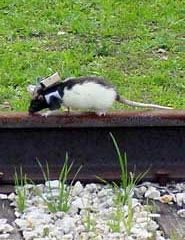Interdisciplinary Research
News and developments from the field of interdisciplinary research.
Among other topics, you can find stimulating reports and articles related to microsystems, emotions research, futures research and stratospheric research.

Health and the Environment: European research on endocrine disrupters receives major boost
Europe’s leading researchers on human health and wildlife impacts of endocrine disrupters will be brought together under a new research “cluster” supported by DG Research which is to contribute €20 million. This cluster project will provide a critical mass for new and existing research on endocrine disrupters and their effect on human health and on the environment. Endocrine disrupters are suspected of causing problems for human health and wildlife. For instance, cases have been reported of fish, fro

University Researchers to Watch Game Show – Who Wants to be a Millionaire? to discover what people feel about risk
Researchers at the Universities of Warwick and Keele are being supported by the Economic and Social Research Council to watch the popular game show Who Wants to be a Millionaire? The globally broadcast show is a treasure trove of data on how all sorts of people of different ages and genders and nationalities perceive and act on risk.
One of the researchers, economist Professor Ian Walker from the University of Warwick said:
“Many decisions involve weighing up potential gains and losses w

Dog and jackal hybrids are perfect sniffer ’dogs’
Nowadays society is deeply concerned with the safety issues, the flight safety in particular. Despite the technological progress, people can not do without dogs` assistance, as no device is capable of replacing the dogs` scent in search of explosive substances and drugs. Dogs are indispensable for differentiating between different individuals by specific smells. To work efficiently a dog needs excellent scent and ability to learn quickly. It is only in Russia that the unique animals -dog and jackal h

Color Images More Memorable Than Black and White
Psychologists have found that colors enhance an individual’s visual memory. From a series of experiments, researchers learned that subjects were more likely to recall the color version of an image than the same scene in black and white. The results, which appear in the May issue of the journal Experimental Psychology: Learning, Memory and Cognition, also indicate that natural colors make a difference. A photo of a landscape with a green sky, for example, will not lodge as effectively in the brai

Infliximab could offer long-term benefits to people with Crohn’s disease
Sustained use of the drug infliximab could offer substantial clinical benefit to people with Crohn’s disease, conclude authors of a study in this week’s issue of THE LANCET.
Crohn’s disease is a chronic inflammatory disorder of the intestines. Patients often have to be treated with steroids, which are associated with severe side-effects. Previous research has suggested that the drug infliximab could reduce disease symptoms in the short term; Stephen Hanauer and colleagues from the Universit

Here come the Ratbots
Desire drives remote-controlled rodents.
Remote-controlled rats could soon be detecting earthquake survivors or leading bomb-disposal teams to buried land mines.
Signals from a laptop up to 500 metres away make the rats run, climb, jump and even cross brightly lit open spaces, contrary to their instincts. The rodents carry a backpack containing a radio receiver and a power source that transmits the signals into their brains through electrical probes the breadth of a hair.